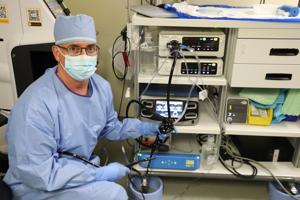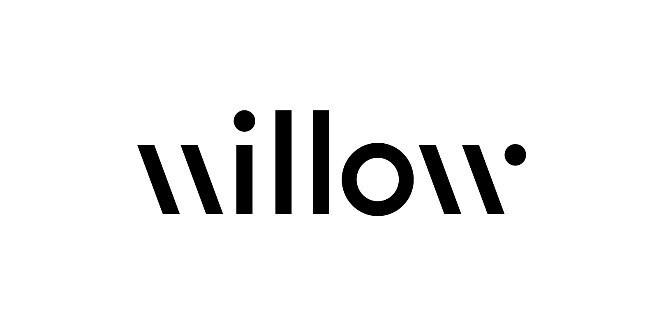Chances are, artificial intelligence is operating in subtle but significant ways whenever you visit a doctor. While you discuss your ailments, worries or test results, instead of typing on a computer keyboard, your provider may be recording your conversation with a cellphone, tapping an anywhere/anytime app that identifies multiple speakers, translates heavy accents and compiles a concise medical summary — minus any musings about the Red Sox, rain or hot weather. This ambient listening technology, a form of AI, has saved time and labor at the Elliot and Southern New Hampshire health care systems for more than 18 months, providers say.
It’s not the only artificial-intelligence health care technology blooming in New Hampshire. AI is assisting during gastroenterology, radiology and routine office visits. It’s transforming diagnostics and cancer detection, furnishing automated patient reminders, scheduling appointments and playing a role in medical records.

General surgeons at Speare Memorial Hospital in Plymouth have been using GI Genius to identify colorectal cancer since 2022. Catholic Medical Center has harnessed AI in radiology for roughly a year to help diagnose serious ailments by CT scan, including artery blockages, blood clots in lungs and emerging conditions that have to be watched. “It’s not a diagnosis.
It’s a probability assessment,” said Dr. Robert Sprague, medical director for radiology at CMC. “It’s an additional tool that helps us interpret.
It’s like a second pair of eyes.” Dr. Robert Sprague, a radiologist at Catholic Medical Center, looks over digital scans of a patient.
Next month Elliot Hospital plans to roll out AI in radiology, according to a hospital spokesperson. Call it a fast-moving genie in a bottle. AI is bringing greater speed, efficiency, information and accuracy to health care areas including radiology, pathology, gastroenterology, genomics, drug development, record-writing and keeping, and anywhere it can function as the world’s fastest reference library.
Doctors in New Hampshire claim it reduces administrative burdens and the potential for human errors or omissions. It can help determine which emergency room patients should be seen first, and flag those whose conditions should be followed, sending notifications to physician workstations. Eventually, AI might conduct initial interactions with patients with common and simple complaints.
At this point, it’s being adopted slowly and incrementally across the Granite State, after research and vetting by the state’s health care systems, and with measures to protect patient information. It’s a high-tech tool — not a man-made force poised to take over medicine, doctors say. National research shows that doctors and patients still prefer person-to-person care relationships and value physician expertise more than machine learning in patient care.
According to Pew Research Center, 60% of Americans surveyed in 2023 said they would feel uncomfortable if their own health care provider relied on artificial intelligence in diagnosing disease and recommending treatments. But AI is improving quickly, and its future is hard to predict. AI inventions and extensions are debuting every six to 12 months, offering game-changing developments, according to doctors in New Hampshire.
“The entire health care sector is exploding with how to leverage AI,” said Dr. Jon Michael Vore, chief medical information officer for Southern New Hampshire Health in Nashua. The AI revolution is not a coup, Vore said.
It’s an efficiency tool. “It’s only as smart as the people who are programming it. You still need to have that human input to make sure that what AI (states or recommends) is appropriate and makes sense in a clinical context.
” “AI is an informed suggester, not a decision-maker,” said Dr. Shawn Stapp, an emergency room physician and chief medical information officer at Elliot Hospital. “We don’t have any thoughts or ideas in medicine that AI would replace,” said Dr.
Holly Mintz, chief medical officer of ambulatory services for Elliot Health. “We’d always have clinical eyes on it.” In New Hampshire, AI technologies are used most for clinical visit recording, radiology and gastroenterology.
Dragon Ambient Listener operates silently in the background, filtering out jokes, gossip and casual conversation, deciphering accents and correctly identifying multiple speakers whose names have been announced. Used with patients’ permission, it generates a report on a medical visit, which is then reviewed by a doctor. Dragon Ambient Listener and Dragon Medical One, AI-enhanced dictation and transcription tools, have slashed the time spent on recordkeeping, boosted time interacting with patients by cutting down on doctors typing notes as patients talk, and lessened burnout from routine tasks that spill into after hours, according to providers affiliated with Elliot Hospital and Southern New Hampshire Medical Center, where the technology is routinely used.
“AI can have a major impact on the quality of patient-provider interaction,” said Mintz at Elliot Health. “Nobody wants to go to medical school to type on a computer.” “Whatever we can do to make people’s work-life balance better, the more we’ll be able to keep them in the field,” said Vore at Southern New Hampshire Health.
Burnout plagues the profession, he said. One doctor told Vore that with AI listening, culling and generating office notes, “I can now get out of the office at 5 p.m.
and go home and have dinner with my family.” GI Genius, an artificial intelligence technology, helps gastroenterologists and surgeons catch gastrointestinal cancers and pathologies in the beginning stages. The pattern-recognition technology has increased detection rates by 14%, doctors say, and now is used at Elliot Hospital.
At Speare Memorial in Plymouth, New Hampshire’s first hospital to use GI Genius, Dr. Ernest Hanowell, a general surgeon, puts it to work in endoscopy and colonoscopy cancer screenings, when treating Barrett’s disease and reflux disease, and in gallbladder, hernia and trauma surgery. The GI Genius assistant is attached to a scope that peers at the lining of the gastrointestinal tract, highlighting polyps that appear suspicious regardless of covering tissue folds and debris that make it difficult to see.
“It’s an intelligent endoscopy, using AI in a real-time manner,” Hanowell said. “It’s tied in to detect all sizes of polyps,” flat and raised, and has a 50% or greater likelihood of finding multiple polyps. With a sensitivity rate of 99.
7%, Hanowell believes it’s a potential lifesaver. Colon cancer is the third most common cancer in the U.S.
, with roughly 150,000 new cases each year, according to nationwide medical data. “It’s not taking the polyp off of you — it’s a targeting system,” and patient interest is high. About once a week, “We’re having people travel from other areas of the state and other states because they want an AI-enhanced endoscopy,” he said.
Aidoc, an AI technology used in radiology at CMC for roughly a year, analyzes images as they come off a CT scanner — assisting in as many as 50,000 scans so far, according to estimates. “It’s an additional tool that helps us interpret them,” said Sprague, the radiology head. “It’s not doing our job.
It’s making us better in our job. It’s more efficient and increases sensitivity. The radiologist still has the final say-so.
” It can spot small and subtle irregularities, including bleeding inside the skull. Aidoc is helping to identify blood vessel blockages that occur in stroke. It reviews a library of “a few hundred thousand cases” of what intracranial hemorrhaging looks like, Sprague said.
Artificial intelligence is not confined to CT scans, he said. MRI scanners are increasingly manipulating AI to acquire images more quickly and efficiently. “It’s a valuable tool,” he said.
“Critical diagnoses are brought to our attention more quickly. But you still need a physician with that training, expertise and empathy running the show.” “If it flags something, is it a true positive or a false positive? You need a physician passing on the final report.
It’s a symbiotic relationship. It’s not an answer key. It’s another safety net in our process that allows us to be as accurate as possible.
” “I don’t see it replacing us,” the radiologist said. “It’s a useful tool as long as it’s developed properly and ethically.” Southern New Hampshire Health’s Vore sees AI taking on more routine roles in the future, including answering questions that patients send by email and through patient portals, which occur 24-7.
Physicians would have to review and potentially edit what AI comes up with, but this could cut down on phone tag. ”With emergencies, you still need to call or go to the emergency department,” he said. Standard advice for simple ailments, like colds and sprains, could be fair game for AI, Vore said.
It’s message might be: “Rest. Take an anti-inflammatory. Increase fluids.
If it does not improve in the next three to five days, call the office for an appointment.” Vore predicts that within the next three to five years, AI may play a greater role in treatment and diagnostics, including by furnishing a list of medical conditions to consider based on an input of patient symptoms. ”We’ll still need a clinician to understand the nuances,” said Vore, who worked in family medicine doctor for15 years before serving as a liaison between IT and health care providers.
AI coould recommend medications after reviewing a patient’s health history, co-occurring conditions and demographics. In the end, “It matters what your patient population wants,” he said. “Some people would rather talk on the phone than use a portal.
” The optimal balance is having the technology available while preserving the option for in-person appointments, he said. ”Providers know what they want systems to do, but they don’t know what the technology can do. As a healthcare organization, we’re staying up with current technology and what’s available,” he said.
[email protected].


















